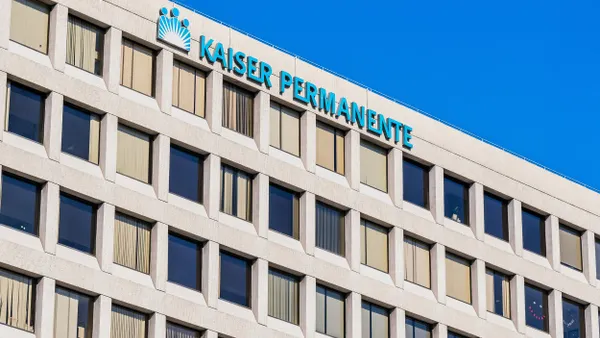Dive Brief:
- Fewer doctors are employed by independent physician practices as offices are acquired by health systems, insurers, private equity firms and other companies, according to a review of studies published Monday by the Government Accountability Office.
- For example, about 47% of physicians worked for or were affiliated with hospital systems last year, compared with less than 30% in 2012, according to a study by the American Medical Association cited in the report. Other research showed similar increases in consolidation between practices and hospital systems.
- Physician consolidation with health systems can lead to higher prices, as well as a decrease or no change in care quality, according to the report. However, the impact of consolidation with other entities — like payers, private equity firms or retailers — was less clear or unknown.
Dive Insight:
Acquisitions of physician practices — and worries consolidation will drive up prices and worsen care delivery — is not a new trend in the healthcare sector.
Physicians argue maintaining independent practices has become increasingly challenging as expenses rise faster than revenue, according to the GAO’s analysis, which included peer-reviewed studies and reports as well as interviews with industry stakeholders.
Doctors also see acquisition as a way to use scale to negotiate higher payment rates with insurers, improve access to expensive resources and lessen administrative and regulatory burdens, the report found. Additionally, selling practices is an attractive option for doctors looking to retire — an important factor as the physician workforce ages.
And as the number of independent doctor’s offices dwindles, consolidation becomes even more likely for the practices still operating on their own.
“With greater consolidation, remaining independent practices may face additional challenges, such as reduced ability to negotiate contracts and payments with insurers or to receive referrals from other physicians,” the researchers wrote. “This could, in turn, lead them to look for partners to acquire or affiliate with their practice.”
Meanwhile, buyers see a number of benefits to acquiring physician practices. Health systems gain additional revenue for physician services while increasing the number of referrals to their hospitals for care. Plus, as hospital systems increase their market share, they could command higher payment rates from insurers, according to the analysis.
Hospitals say operating physician practices also helps them shift to value-based payment arrangements, as owning doctor’s offices allows them to coordinate care across settings.
However, the analysis found some negative consequences of hospital-owned physician practices. Three studies found that higher Medicare spending was linked to delivering more services in hospital settings.
One analysis found total spending per Medicare patient increased by 5% for select elective surgeries from 2010 to 2015, in part due to replacing doctor’s office visits with pricier hospital outpatient visits.
Hospitals argued spending could rise after an acquisition because of increased utilization. Plus, acquiring health systems sometimes incur costs to improve the financial stability of purchased practices.
Physician groups saw another potential reason for costs increases, according to the report.
“Hospitals may expect primary care physicians to see more patients in shorter duration appointments, which could increase patient referrals for additional diagnostic testing or visits with specialists,” researchers wrote.
Insurers are another type of buyer scooping up physician practices, though estimates of acquisition by payers varies, according to the report. One study found about 2% of physicians worked in practices owned by insurers, though that likely doesn’t include doctors in practices affiliated with, but not owned by, payers.
Payers acquire physician practices to gain leverage when negotiating prices with other providers while lowering costs of care and pushing participation in value-based care, according to the GAO report.
Additionally, owning or affiliating with physicians could give Medicare Advantage insurers more influence on how doctors document patients’ health conditions — potentially increasing their reimbursement from the government by inflating beneficiaries’ illness.
The practice, called upcoding, has received scrutiny from lawmakers and regulators for driving up Medicare costs.
Private equity ownership of physician practices is also on the rise, though investment varies by specialty and market, according to the GAO analysis. One study found about 6.5% of physicians worked at private equity-owned practices last year, compared with 4.5% in 2022.
The funds typically invest in practices and then sell the offices within three to 10 years. Private equity firms sometimes consolidate smaller practices to increase market share or negotiating power, or link practices under a management services organization to share administrative and financial work.














